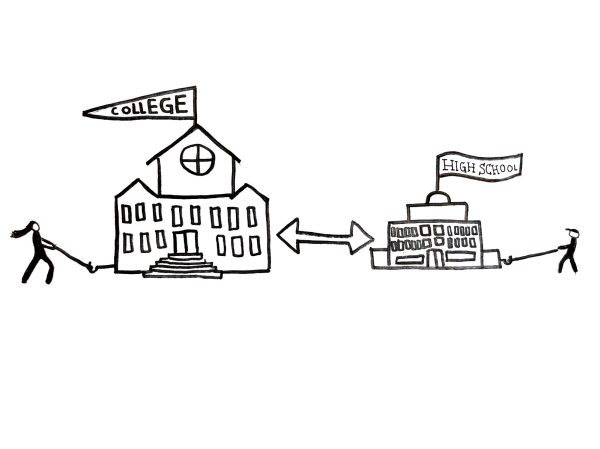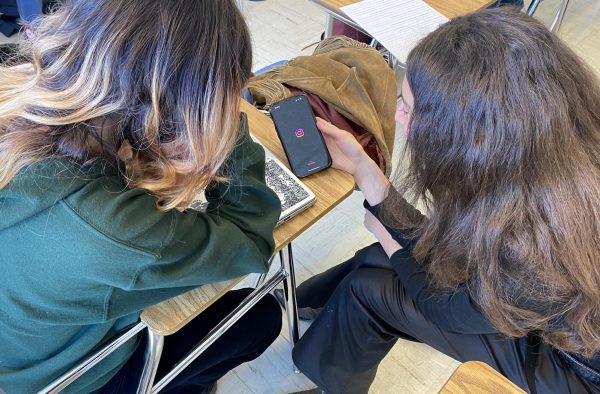Is Excessive Homework the Cause of Many Teen Issues?
Does excessive homework really make a student perform worse? Is homework a big influencer on the emotional and physical health of students? Can we change the bad reputation homework has obtained over the years or is it too late?
Today, schooling is ever-changing, currently focusing on a “necessary” end goal of attending college. Standards are rising, teachers are better trained, and students are left with rigorous courses riddled with hours and hours of homework. People are now wondering how important homework really is. Is that just the overload talking or does homework actually have a negative impact on students?
Popular opinion would suggest yes, claiming that homework is a useless and stress-inducing part of school at any age. Many Boulder High students communicate a similar complaint.
Seniors Carson Williams and Carson Bennett voiced their opinions. Bennet says that “Homework results in later bedtimes which means we get less sleep and therefore, have less energy the next day.” Williams agreed and added,“Homework is good if you need it to study, but if it is just busywork then it is useless.”
Another student, Bishal Ellison, commented that in some classes “homework doesn’t impact [his] success, there is no point … In one of [his] classes, homework is just for extra credit.”
While student opinions are extremely significant, teachers are the ones in control of this so-called “stress inducing and useless activity.”
Mr. Weatherly, an AP World Geography teacher here at Boulder High, commented that homework has an enormous impact on the success of students within the class; he claimed that there is simply not enough time in class to review everything. He does, however, agree with popular opinion, saying, “Teachers give homework thinking about their own class, not the five or six others students have.”
So which is it? How important is homework? Homework has been seen both beneficial and detrimental in association with time. Homework over a certain time limit can cause stress, depression, anxiety, lack of sleep, and more.
Homework distracts from extracurriculars and sports as well, something colleges often look for. Homework is ultimately leading students to resent school as a whole.
According to a study done by Stanford University, 56 percent of students considered homework a primary source of stress, 43 percent viewed tests as a primary stressor, while less than one percent of the students said homework was not a stressor. They were able to conclude that too much homework can result in a lack of sleep, headaches, exhaustion, and weight loss.
Experts denote that the homework assigned to students today promotes less active learning and instead leads to boredom and a lack of problem-solving skills. Active learning, done through students learning from each other through discussion and collaboration, enhances a student’s ability to analyze and apply content to aid them in a real-world setting.
This negative attitude towards homework can, unfortunately, arise at a young age, especially in today’s schooling systems.
Students in all grades are required to extend the hard rigor of school past the average eight hours they need to spend inside the building. According to an Education Week article by Marva Hinton, kindergarteners are often required to do a minimum of 30 minutes of homework a night; these young students are expected to read for 15 minutes as well as work on a packet for another 15-30 minutes.
Kindergarten is forcing children to learn concepts they may not be ready for, discouraging them at a young age. As a principle rule, the National PTA recommends 10 to 20 minutes of homework per night for children in first grade and an additional 10 minutes for every grade after that.
After this time marker, homework begins to be detrimental to the success of a student. Additionally, according to the Journal of Educational Psychology, students who did more than 90 to 100 minutes of homework per night actually did worse on tests than those with less than 90 minutes of homework.
The hours of homework students receive takes time that could be spent on extracurriculars, with family and friends, or on sports or activities. Children and young adults focus a large part of their time and energy on school, removing time to replenish and work on other skills in life, including socializing.
Physical activity can actually be very beneficial to the success rates of students, improving self-esteem, well-being, motivation, memory, focus, and higher thinking.
According to the US Center for Disease Control and Prevention (CDC), exercise has an impact on cognitive skills such as concentration and attention, and it enhances classroom attitudes and behaviors.
The more time taken away from the emotional and physical health of a student, the more resentful they will be towards school. In kindergarten, over 85 percent of students are enthusiastic about learning and attending school, whereas 40 percent of high school students are chronically disengaged from school and any learning that takes place.
What’s even more baffling is that as students enter high school, they are expected to be enthusiastic about school, obtain perfect grades and test scores, and do extracurricular activities and sports in order to get into a good college.
Logan Powell, the Dean of Admissions at Brown University asks when accepting students, “Have they learned time management skills, leadership, teamwork, discipline? How have they grown as a person and what qualities will they bring to our campus?”
These are unrealistic standards for students who most likely already have negative attitudes towards school and homework and aren’t given the opportunity to work on the skills colleges look for by exploring their community through clubs, volunteering, and working.
Experts see how detrimental homework can really be for a plethora of reasons; Donaldson Pressman reported that homework is not only not beneficial to a students grades or GPA, but it is also detrimental to their attitude towards school, their grades, their self-confidence, their social skills, and their quality of life.”
Homework, however, helps student achievement, reinforces good habits, involves parents in their students’ learning, and helps students remember material learned in class.
This is all based on the circumstances however, if schools keep making homework more prominent in the learning system, students will lose their passion for learning. Unfortunately, many of us already have. So when teachers consider giving homework to their students, they should ask themselves how they believe it will improve their students’ learning and abilities.






Chris • Feb 23, 2023 at 6:24 am
I hate homework in 5th grade
Jason • May 24, 2023 at 8:25 am
good luck in 7th grade then cuz that’s where finals start to get difficult. I’m barely keeping up right now and have to stay up late to keep up with the work.
John • May 9, 2022 at 11:40 am
Good article very informative.
Garrett • May 19, 2022 at 7:01 pm
yes i agree